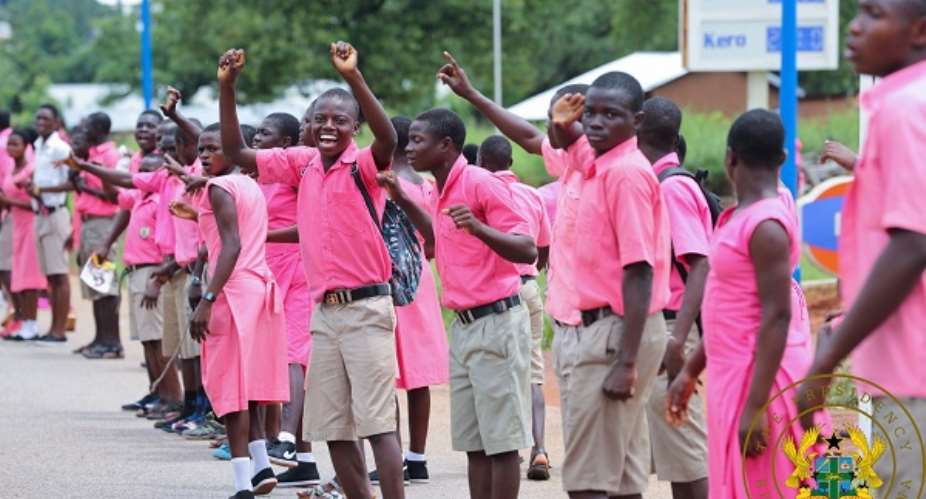From the onset of implementation of Free SHS policy, my concern has been how government can sustain funding for such a good policy (Ghana has limited resources). The policy is very good but it will burden heavily on the government expenditure side, and if care is not taking other developmental activities will come to a halt (as all the scarce resources may be forced to be diverted to sustain the Free SHS policy due to astronomical increase in enrolment).
I have been cautious in my comments all this while because I could not see ‘inside the government pocket’. Nevertheless, I am very sure if Secondary Schools in advanced countries like United Kingdom, US, etc (they do not board secondary school students) are concern about funding, then Ghana (most secondary schools are boarding) is likely to encounter funding problem.
My concern reinvigorated when the Finance Minister (who sees inside the government pocket), Mr Ken Ofori-Atta shared a personal, but a genuine concern that ‘’I can’t take my child to Achimota or Odorgonno and drive away and I, Ken Ofori Atta , not paying anything, once I can pay for ten people’’. In fact, the minister was expressing an honest concern; there are many people in the country that can afford the fees at SHS without difficulty, and should pay. On the other hand, there are people who genuinely cannot afford these fees, and they are the people who should benefit from the free SHS policy. One common characteristic of all developing countries is that of huge pay gap. I have suggested in this submission that those who fall within higher-income bracket should be motivated to pay for their children’s fees at the SHS, whiles the lower income groups should benefit from the policy (Free SHS). I know some people may want to know how we can determine those in higher income group because of lack of database as suggested by the Finance Minister. In Ghana’s case, we do not need a database, as we cannot have a comprehensive one now due to the large informal sector of Ghana’s economy. What I know is that right policy will guide the population to make a choice that suite them without building and dissecting a population database.
Here in United Kingdom, Secondary education is free, but parents are made to provide food and other minor things such as sport, club, and excursion fees etc, and addition, accommodate them (students live with their parents). Majority of children attend secondary school near their homes (what we call day schools in Ghana or community Secondary schools), which means boarding school children has become less useful. There are some schools that provide boarding facilities, but in this case, parents have to pay for their children.
I will like to suggest the following four (4) steps for sustainable but equitable Free SHS in Ghana:
- Government should pay for only tuition fees (including study materials, etc), and focus on developing school infrastructure, but those who decide to live in the boarding houses should pay for the boarding cost (food, light, water etc). This is to make the system fairer because their counterparts in so-called ‘Day Schools’ pay for these services themselves (government absorbing boarding cost is discriminatory against thereof).
- Students should be encouraged to attend community secondary schools near them (these schools should be upgraded to meet the national standards).
- In order to make the so-called deprived secondary schools attractive for the community secondary school going age, incentives (good, free accommodation, promotion, etc) should be given to teachers who accept postings to these schools (after all their counterparts in the cities have access to many opportunities e.g possibility of upgrading themselves, doing their master’s degree etc).
- To provide incentives for people who can afford (like Mr Ken Ofori Atta) to pay for their children, such parents should be allowed to choose any secondary school of their choice (provided there is a space) for their children once they make a commitment to pay for the full fee.
When this is well implemented, I believe the people will ‘naturally’ make choices that suite their needs without the government building a database of people’s income (which given the informal nature of Ghana’s economy will not be plausible). There are some traders at say Makola Market, who worth millions of dollars, but their incomes cannot be captured.
The policy of Free SHS is good for the future of our children and the country as a whole and all efforts should be made to see it succeed.
By: Martin Kyere (UK)
Email: [email protected]





 Dumsor: Energy sector ‘shepherdless’ – Nana Amoasi VII
Dumsor: Energy sector ‘shepherdless’ – Nana Amoasi VII
 Train accident: Four more grabbed and remanded
Train accident: Four more grabbed and remanded
 Gov't to consolidate cash waterfall revenue collection accounts
Gov't to consolidate cash waterfall revenue collection accounts
 Gov't to settle lump sum for retired teachers by April 27
Gov't to settle lump sum for retired teachers by April 27
 Former PPA CEO granted GH₵4million bail
Former PPA CEO granted GH₵4million bail
 Dumsor: The darkness has exposed you; you’ll go down as the worst in Ghana’s his...
Dumsor: The darkness has exposed you; you’ll go down as the worst in Ghana’s his...
 Dumsor: The ‘incompetent’ person provided a timetable whiles those who came to s...
Dumsor: The ‘incompetent’ person provided a timetable whiles those who came to s...
 Defend, ensure NPP’s good works are ‘sold’ and highlight the ‘bad’ state of the ...
Defend, ensure NPP’s good works are ‘sold’ and highlight the ‘bad’ state of the ...
 Bawumia will rank high ahead of Mahama in any anti-corruption test — Salam Musta...
Bawumia will rank high ahead of Mahama in any anti-corruption test — Salam Musta...
 NPP trying to bribe us but we‘ll not trade our integrity on the altar of corrupt...
NPP trying to bribe us but we‘ll not trade our integrity on the altar of corrupt...
